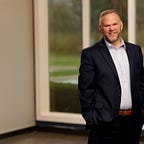On finding your True Pursuit
Begin with the end in mind
Something we always tell our students as they are beginning their journeys in the world of career-tech is to “begin with the end in mind”. For all the talk of “living in the moment”, it is crucial for students who have been part of a traditional education system for the first eleven or so years of their lives to break out of the status quo, look ahead, and see the value in stepping outside of their comfort zones into the focus of skilled training mixed with relevant academics.
We believe the two years most students spend in a career-tech program can be a catalyst for finding their true pursuits. Finally, they are able to specialize in a career pathway and see what options they have available to them in the future. Finally, they are able to see why math and science and other subjects are relevant in various career fields. Finally, they are able to test the waters, deciding “do I really want to be a nurse or a coder or an engineer?” long before assuming they do, and then spending thousands of dollars on college tuition before realizing, “oh, this is not really for me.”
Of course, career-tech is not the only educational option available to do this. As Getting Smart CEO Tom Vander Ark says in the Tolles-produced documentary, True Pursuit, “There are many ways to learn and earn.” We may just be a little biased that career-tech is one of the most underutilized, most under appreciated, and certainly most misunderstood options out there. You can read my previous essay “It’s Time To Talk About Career-Tech”to learn more about that.
For decades, America has revered a very specific post-secondary path as a means for guaranteed success: graduate high school, attend a four-year college and land the job of your dreams.
While this model may have once ensured employment, the situation in 2016 has dramatically changed. In 2012, according to The Atlantic, 53 percent of students who graduate with a bachelor’s degree are underemployed or unemployed. The classes of 2014 and 2015 college graduates, reports Accenture Strategy, had 51% working in jobs that do not require a degree. In many instances, these programs are failing to equip students with the skills to meet the needs of the current job market. Students are paying for a university name, rather than the skills and training that will help them secure a job. Graduation no longer guarantees employment or a steady income, but for two out of three, it does come with thousands of dollars in accumulated student debt.
With rising student loan debts and workforce shortages, attitudes about career-tech are shifting and evolving. The reality that a four-year degree might not ensure a high-paying job is causing parents and K-12 schools to reconsider new and better options. With this shift in mentality, career-tech is being elevated as a potentially smarter path to career success.
That’s why we created a film called True Pursuit, a documentary featuring interviews and insights from educational leaders, parents, teachers and most importantly students of all ages.
Somewhere between all of the rhetoric about college and career preparation, lies our students’ true pursuits, we believe. We want to have that conversation.
True Pursuit is also a campaign, a resource and an educational tool. We hope to see it grow into a movement over time, allowing parents and students to ask the right questions about what’s best for their children’s future instead of falling into the belief that only college is the right end game. College — like apprenticeships and credential training and early work experience — is just one avenue on a path to the ultimate goal: career.
The documentary is available to watch in its entirety at TruePursuit.Life, a special website developed not only for the film, but also for the conversation. We invite you to learn more by visiting the site, check out our Pursuit Starters that break the film down into chapters with discussion questions, action steps and additional resources, including a downloadable community discussion guide. I would love to hear your thoughts about this topic we need to start talking more about.
1635 is a newsletter and a monthly moment to propel us forward in public education. Each month it features long-form content from those working both inside public education and from those on the outside looking in. We can learn so much from both viewpoints. The newsletter delivers the last Tuesday of every month. Subscribe.
